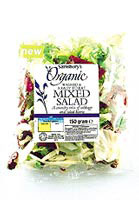Checkout organic growth
Friends of the Earth recently published a report on real food and Iceland has announced that all its vegetables will soon be organic.

| <b>Organic lines</b> | <b>Own brand</b> | <b>Total</b> |
| Sainsbury’s | n/a | >650 |
| Safeway | n/a | >350 |
| Asda | approx 120 | 245 |
| Tesco | n/a | >500 |
The management team at Iceland must surely have known that Friends of the Earth was to publish its report on Real Food last week. Iceland’s announcement that it has acquired 40 per cent of the world’s organic vegetable supplies could almost be retaliation for not topping the Friends of The Earth Supermarket League Table. And, while FOE had already published the results, it now recognises that Iceland’s ranking needs a rethink.
The 760-strong frozen food group is to invest £8m in changing its own-brand vegetables to organic ones at, crucially, no extra cost to customers. A further £1m will be donated to the National Trust to encourage organic farming in the UK. Iceland chairman Malcolm Walker says the decision to import 80 per cent of the organic produce was influenced by a UK shortfall in organic farming.
An FOE spokesman says “We welcome the Iceland move, particularly as they are going to offer organic [produce] at no extra cost to the consumer. We did our survey before their announcement, and I am sure that they would have got an extra mark or so.”
Of concern to the supermarkets in the timely FOE survey ought to be their ability to procure enough organic vegetables to expand the relatively few lines they currently stock (see table). They are unlikely to lose too much sleep though, given their market strength. Indeed, supermarkets are seen by many as the key to unlocking further conversion to organic farming, both in the UK and abroad.
A Tesco spokeswoman says the group’s strategy is to increase the number of organic lines within the store (currently about 530) wherever possible, in conjunction with British farmers converting to organic farming methods. But Tesco still has no single person in charge of its organic lines.
“This year we project to take over £200m [with organic goods],” she says. In relation to any threat posed by the Iceland initiative she says: “A lot of British suppliers are converting to organic farming. We have our own sources that have been cultivated over the long term.” Retailers aren’t stepping on one another’s toes here, she says.
While rivals have been quick to call Iceland’s move a publicity stunt, few would deny the rise in demand for organic. The next round of the supermarket war could be fought for organic brand supremacy. Smaller chains such as Planet Organic, currently introducing a new identity by Pocknell Studio, could set the early pace.
For its part, Iceland is now set to roll out new organic packaging, being created at its in-house design studio. Iceland brand manager Simon Reeve says: “Our extensive customer research has revealed that about seven out of ten are interested in organic. But three quarters of the people interested in buying organic thought that the price was a barrier.”
Reeve explains the “full conversion strategy” to organic begins with ice-cream, which has been packaged to go into stores next week, followed by vegetables in October, with other lines to follow. “We caught our competitors by surprise although inevitably there will be some reaction. Our aim is to bring the Iceland brand personality and organic together in a way that is accessible, and with a bit of humour and fun,” Reeve adds. He says until now organic branding has been stuffy.
Never before has “organic” been such a central issue to the major supermarkets. The question is whether organic branding will become pivotal to the branding of the big player’s stores and goods, and if it does, how it will trickle down the food chain to smaller chains. If it does, then design groups stand to be one of the major winners, benefiting from a sudden demand for new product packaging.
Organic Ranges
| <b>Organic lines</b> | <b>Own brand</b> | <b>Total</b> |
| Sainsbury’s | n/a | >650 |
| Safeway | n/a | >350 |
| Asda | approx 120 | 245 |
| Tesco | n/a | >500 |
The Friends of the Earth Supermarket League Table
| Organic | Pesticides | GM-free | <b>Total</b> | ||
| 1 | Waitrose | 3 | 3 | 2 | <b>8</b> |
| 2= | Iceland | 1* | 2 | 3 | <b>6</b> |
| 2= | Asda | 1 | 2 | 3 | <b>6</b> |
| 4 | M&S | 2 | 0 | 3 | <b>5</b> |
| 5 | Co-op | 1 | 2 | 1 | <b>4</b> |
| 5 | Sainsbury’s | 2 | 0 | 2 | <b>4</b> |
| 7 | Safeway | 1 | 0 | 2 | <b>3</b> |
| 8 | Morrisons | 1 | 0 | 1 | <b>2</b> |
| 8 | Somerfield | 1 | 0 | 1 | <b>2</b> |
| 8 | Tesco | 1 | 0 | 1 | <b>2</b> |
| 11 | Aldi | 0 | 0 | 1 | <b>1</b> |
| 12 | Netto | 0 | 0 | 0 | <b>0</b> |
Each section is scored out of four points. For the organic section one point is scored for stocking any organic goods, two if it accounts for 3 per cent of food sales, three for 10 per cent and a fourth point for supporting changes to organic farming legislation.
*scored before recent organic food initiative announced
-
Post a comment



